FAQs About Alternative DNA Samples
Alternative DNA Samples and How They Work
DNA testing with alternative DNA samples has become an invaluable tool in various fields, from forensic investigations to personalized healthcare. Traditionally, DNA samples have been collected through blood draws or buccal swabs (the best method). However, advancements in technology have led to the emergence of different type of items for DNA samples. These items offer new possibilities and convenience in various scenarios. On this page, we have compiled the most frequently asked questions (FAQs) about non-standard DNA samples we receive..
What Are Alternative DNA Samples?
Alternative, or “non-standard” DNA samples refer to different types of items that can be used for DNA analysis. These are used instead of the conventional buccal samples. These alternatives provide unique advantages in specific situations, such as when it is challenging or inconvenient to collect traditional samples. These alternative samples can include hair, saliva, urine, nails, semen, and even touch DNA.
FAQs About Non-Standard Items For DNA Testing
Yes. Anything other than a mouth swab is considered a non-standard, or alternative DNA sample. With discreet DNA testing, you may choose to secretly test someone by using and sending us samples such as hair, fingernail clippings, ear wax swabs, toothbrush, cigarette butts, chewing gum, and more. We don’t guarantee that DNA will be found on the sample that you provide to us, but if it does contain DNA, we can compare it to yours or your loved one to determine paternity, maternity, sibling, grandparent, or avuncular relationships.
As long as the lab technicians are able to obtain a DNA profile from the sample, the results as just as accurate as a mouth swab. Using a higher number of genetic markers to test each person allows us to issue testing results that are 100% accurate based on the profiles generated.
We often get requests for DNA testing with hair. This is because hair samples are so easy to come by, and can be easily and discretely collected. But it is not so simple and straightforward.
Any hair that have fallen out of the body will not be suitable. This is because we need each strand of hair you send to have the root (the “bulb” at the end) attached. If the strands of hair do not have the root, we cannot extract DNA. We need a minimum of 6 strands of hair. If you do happen to have some hair samples, take a close look to see whether you can identify a little white ball at the end of each hair – this is the hair follicle.
If you send a brush with hair still in it, we will not be able to test it. We need to have the individual strands placed in a paper envelope.
Please make certain when you put the hair in the envelope that you do not touch the end of the hair with your fingers. If you can use a glove when touching the hair, that is perfered.
Using a non-standard sample does not guarantee that a DNA Profile will be obtained. This is because we have no way to determine the quality of the sample prior to receiving it.
However, it is not just the type of sample that is important but also other variables such as :
– Poor storage conditions (e.g. damp environment, extreme heat or cold, etc).
– Poor sample handling (possible contamination with other DNA or dirt).
– Not enough DNA present (e.g. heavily used toothbrush vs used once only).
In all cases, the laboratory technicians are trained to make every effort, and multiple attempts, at obtaining a usable genetic profile with every DNA sample that is tested.
In most cases, no. Alternative samples are generally provided for discreet testing and therefore cannot usually be used in court.
In some cases, non-standard samples can be used for testing for legal DNA testing. A DNA legal test requires written consent from all parties (or legal guardians), photo identification, and a third party who performs the DNA collection.
If a legal DNA test is being done, and the sample comes from a Medical Examiner, who completes a chain of custody with the specimen to be testing, then items like a tissue sample, blood samples, finger nails or toe nails, for hair samples can be used.
Our experiences Genetic Consultants can help you decide if this option for testing is right for you. Call us at 1-855-362-5224.
Testing of alternative samples may take up to an additional 5 days, depending on the DNA sample. This is to ensure that a strong enough genetic profile can be obtained. Once a DNA sample is found to be viable, the testing ordered will be completed. Our goal is always to help you get the answers you need in the shortest period of time.
Yes, you are protected by our strict privacy policy. No one may access your DNA test information without your written consent.
The Limitations Of Non-Standard Samples
While these type of DNA samples offer convenience, they do have certain limitations. As mentioned earlier, the DNA concentration in non-standard samples may be lower. This can affect the ability to produce test results. Additionally, external factors like environmental contaminants or degradation over time may further impact the reliability of the samples. Therefore, it is important to consider these limitations when opting for alternative DNA testing.
Testing items other than mouth swabs has revolutionized the field of DNA testing. This ability provides a convenient and accessible option for individuals seeking DNA analysis. While they may not offer the reliability as traditional samples, they can serve as a useful tool for non-legal purposes. It is important to understand the benefits and limitations of these DNA samples. This will allow you to make informed decisions when it comes to your DNA testing.


